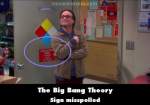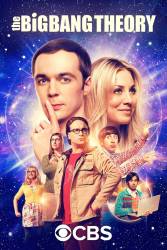
The Cooper/Kripke Inversion - S6-E14
Character mistake: As Leonard is leaving the Mechanical Engineering lab, the sign on the door is spelled incorrectly as 'resticted area' instead of 'restricted area'. (00:04:07)

Starring: Kaley Cuoco, Johnny Galecki, Melissa Rauch, Simon Helberg, Jim Parsons, Kunal Nayyar
Genres: Comedy

The Cooper/Kripke Inversion - S6-E14
Character mistake: As Leonard is leaving the Mechanical Engineering lab, the sign on the door is spelled incorrectly as 'resticted area' instead of 'restricted area'. (00:04:07)
The Excelsior Acquisition - S3-E16
Plot hole: In Series 1, Episode 7, "The Dumpling Paradox, " Sheldon makes an oblique reference to his financial status: "Frankly, if I could afford the rent, I'd ask you [Leonard] to leave, " meaning he cannot pay the rent on his two bedroom apartment by himself - not that he doesn't want to, he can't. However, in "The Execlsior Acquisition, " we find that he does not even cash his pay cheques. He doesn't even deposit them into a bank account - he leaves them in a drawer in his desk. In Series 2 Episode 14 "The Financial Permeability", he lends Penny a large amount of money from a huge bankroll he just happens to have lying about - again, without cashing his pay cheques! He is obviously independently wealthy. Either he doesn't have enough money to afford the rent or he has enough to work without being paid while practically giving large amounts of cash away. Can't be both.
The Extract Obliteration - S6-E6
Stephen Hawking: Do you like brain teasers?
Sheldon Cooper: Oh, I love brain teasers.
Stephen Hawking: What do Sheldon Cooper and a black hole have in common? They both suck. Neener, neener.
The Fish Guts Displacement - S6-E10
Trivia: In the beginning, after talking about the Spider-Man theme, Sheldon says it's right up there after Inspector Gadget and Teenage Mutant Ninja Turtles (to which the gang chimes in "heroes in a half shell, turtle power"). Chuck Lorre, the show's creator, wrote the original TMNT theme song that they are referring to.
The Expedition Approximation - S8-E6
Question: Is the mining song Sheldon sings on this episode a real song? If so, what is it called?
Chosen answer: The song is called "Dark as a Dungeon" and was written and first performed by singer-songwriter Merle Travis in 1946. It has been performed by a wide array of artists, including Tennessee Ernie Ford, Harry Belafonte, Dolly Parton, Queens of the Stone Age, Kathy Mattea and Amy Grant. But it was made most famous when it was performed and recorded by Johnny Cash during his concert at Folsom Prison in 1968. According to Wikipedia: "It is a lament about the danger and drudgery of being a coal miner in an Appalachian shaft mine. It has become a rallying song among miners seeking improved working conditions."
Separate from membership, this is to get updates about mistakes in recent releases. Addresses are not passed on to any third party, and are used solely for direct communication from this site. You can unsubscribe at any time.
Check out the mistake & trivia books, on Kindle and in paperback.
Suggested correction: Not being able to afford doesn't necessarily mean he doesn't have the money, especially a man like Sheldon. He works with a budget and he sticks to it. In his budget he has a certain amount set aside for rent, anything more than that and he can't afford it alone.
Nonsense. If he was sticking to a "rigid budget" he wouldn't have even thought of lending a hopeless credit risk like Penny a single cent. Instead he throws a huge bankroll at her without even discussing a repayment plan.
Rubbish, I stick to a strict budget but still have the money to lend to close friends. Like Penny is to him.
He might have different budgets for different things. People could get a higher margin because they could be of more use to the scientific mind of Sheldon.